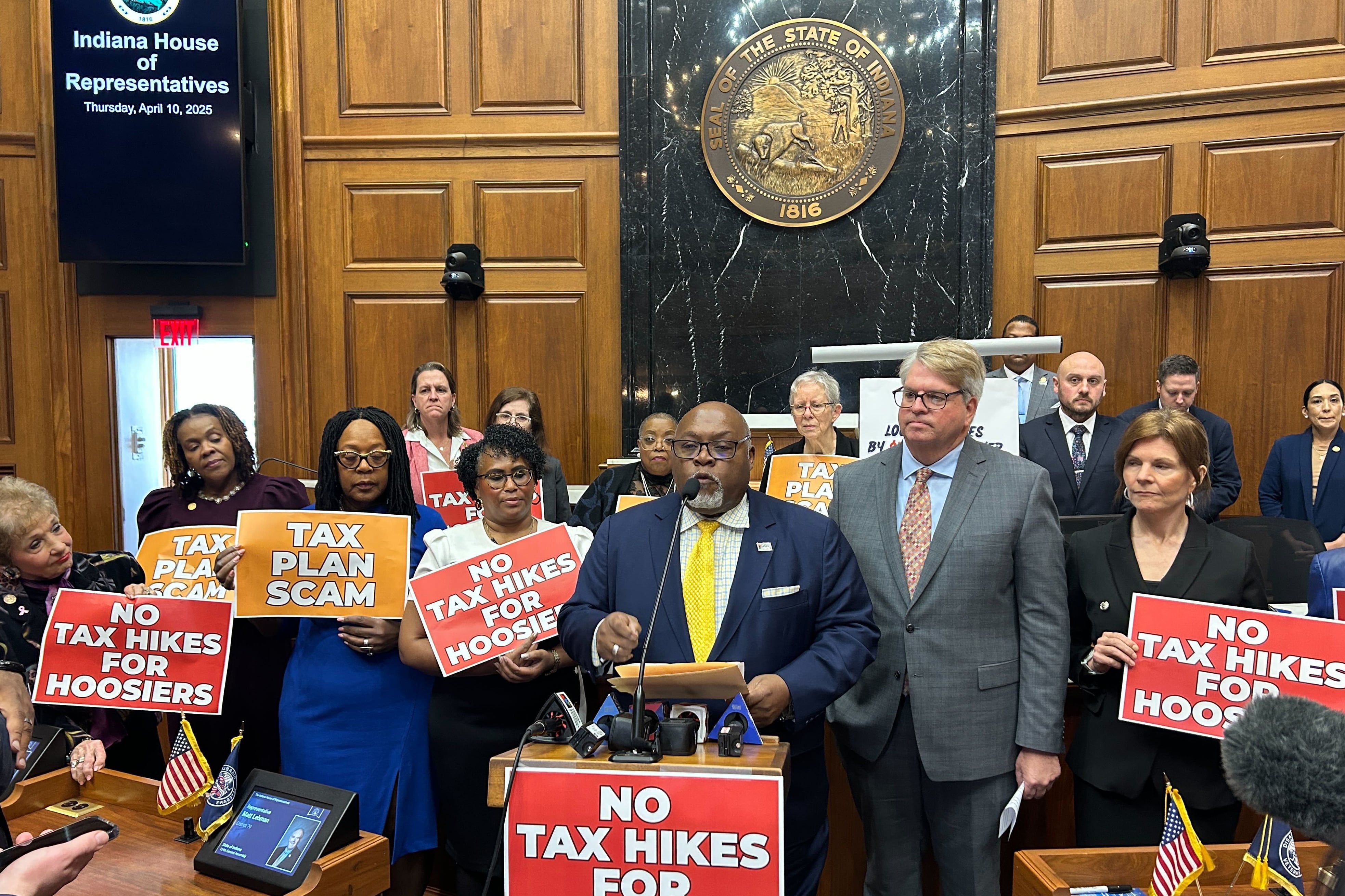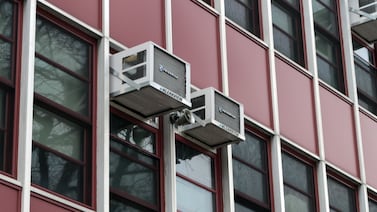Sign up for Chalkbeat Indiana’s free daily newsletter to keep up with Indianapolis Public Schools, Marion County’s township districts, and statewide education news.
Republican senators’ state budget bill would not change the state’s private school voucher program to make it universal, despite support for the idea from Gov. Mike Braun and other lawmakers.
The budget blueprint unveiled by senators Thursday maintains a 2% increase in K-12 tuition support as proposed by the House. And it would cut funding for virtual schools, a big departure from the blueprint proposed by House Republicans, who want to put virtual school funding on par with aid to in-person schools.
The Senate budget bill would also change funding levels from the House budget when it comes to career-focused scholarship accounts and for accounts focused on students with disabilities.
GOP senators indicated they aren’t opposed to universal vouchers but have worries about the cost. That could set up a high-profile debate among Republican state leaders. The House version of the budget includes universal vouchers. Braun campaigned on the idea last year and included them in his own budget blueprint in January. Several states, including Indiana, have dramatically expanded vouchers in the last few years.
The Senate’s proposed two-year state budget comes as districts brace for sweeping financial implications from separate legislation — Senate Bill 1 — that’s focused on property tax reform.
That property tax legislation, which was amended on Wednesday to include an even higher maximum tax credit of $300, is now estimated to cost school districts roughly $744 million over the next three years, according to the latest state legislative analysis.
Republicans are stressing that their plan provides relief for taxpayers. The Senate’s tax reform proposal provides homeowners tax deductions and credits, while allowing local governments to raise local income tax rates.
Speaker Todd Huston also said that property tax revenues have increased for schools year over year.
“They’ve had a few good years,” he said of schools before the House vote on Senate Bill 1, which the House passed Thursday. “We can ask them to do a little more with less to support our taxpayers.”
But Democrats expressed concern over both the state budget and the tax reform legislation, saying that the change shifts the burden to local governments to raise income taxes in order to account for the loss in revenue.
“It is a mirage,” Democratic Rep. Greg Porter told the media after the House advanced Senate Bill 1. “It hurts public education.”
Cost of universal vouchers concerns Indiana senators
Making vouchers available to all families regardless of income would cost the state an additional $89 million in 2026 and $95 million in 2027, according to previous estimates from the Legislative Services Agency.
The state spent about $439 million on vouchers in the 2023-24 school year.
“It’s not that we don’t want to do the vouchers,” GOP Sen. Ryan Mishler, chair of the Senate Committee on Appropriations, told reporters. “It’s just, how do we pay for it?”
The Senate budget also suggests funding virtual schools at 70% of basic K-12 tuition support, below their current level of 85%. That’s very different from the House Republican proposal, which calls for funding virtual schools at the same level as brick-and-mortar schools.
Virtual schools have come under increased scrutiny in recent years, particularly through a federal indictment of former virtual school leaders accused of falsely inflating enrollment numbers and defrauding the state of millions of dollars.
“We just felt there are still some issues in the virtual space,” Mishler told reporters.
There are a few other items in the Senate’s budget that differ from the House budget.
- The Senate is proposing $9.5 million for Career Scholarship Accounts, which offer career-based training for students, for each year of the two-year budget. The House is proposing $15 million for each year. Current funding for the accounts is $10 million this year.
- The Senate’s budget bill provides $10 million each year for Education Savings Accounts, which fund educational services for students with disabilities. That’s the same as current funding. The House’s budget proposes $15 million.
The Senate budget bill does match the House budget proposal when it comes to funding for school safety grants ($27.1 million annually) and gifted and talented programming ($15 million).
It also includes the $86 million annual amount for the Freedom and Opportunity in Education fund, which would give the Indiana Department of Education flexibility to fund initiatives such as student learning recovery grants.
Districts expect to collect less in property taxes
The Senate’s proposed property tax reform would cut many school districts’ revenue significantly, with Indianapolis Public Schools set to take a relatively big hit.
The latest fiscal note for Senate Bill 1 projects IPS would bring in roughly $5 million less than it would have otherwise received in 2026, followed by roughly $4 million less in 2027 and another roughly $5 million cut in 2028.
These estimates account for the property taxes IPS also must give charter schools starting in 2028.
Below are the projected revenue cuts for other Marion County districts under Senate Bill 1.
- Metropolitan School District of Decatur Township: $538,440 in 2026, $369,450 in 2027, and $484,640 in 2028.
- Franklin Township Community School Corporation: $1.5 million in 2026, $869,120 in 2027, and $1.4 million in 2028.
- Metropolitan School District of Lawrence Township: $1.5 million in 2026, $341,140 in 2027, and $853,430 in 2028.
- Metropolitan School District of Perry Township: $3.1 million in 2026, $4 million in 2027, and $6.5 million in 2028.
- Metropolitan School District of Pike Township: $850,430 in 2026, $58,200 in 2027, and $132,460 in 2028.
- Metropolitan School District of Warren Township: $1.8 million in 2026, $1.9 million in 2027, and $2.8 million in 2028.
- Metropolitan School District of Washington Township: $3 million in 2026, $4.1 million in 2027, and $6.1 million in 2028.
- Metropolitan School District of Wayne Township: $2.3 million in 2026, $3.3 million in 2027, and $5.9 million in 2028.
- Beech Grove City School Corporation: $475,100 in 2026, $711,230 in 2027, and $1.3 million in 2028.
- Speedway City School Corporation: $288,510 in 2026, $433,280 in 2027, and $584,300 in 2028.
The legislative session ends on April 29.
Amelia Pak-Harvey covers Indianapolis and Lawrence Township schools for Chalkbeat Indiana. Contact Amelia at apak-harvey@chalkbeat.org.





